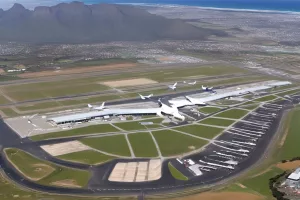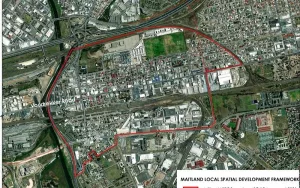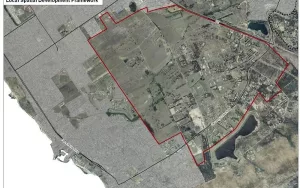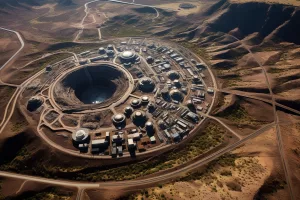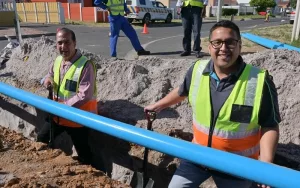The South African government aims to provide safe and affordable housing for all citizens. This includes disaster readiness, durable infrastructure, community involvement, sustainable growth, social equality, and conservational guardianship. The government has implemented policies to promote inexpensive housing alternatives and collaborations between the public and private sectors. They have also undertaken rural housing solutions and legislative measures to oversee the home building industry and safeguard housing consumers. Deputy Minister Hon. Tandi Mahambehlala emphasized the government’s dedication to this vision in her recent address to Parliament.
Cape Town is a vibrant and dynamic city that showcases its commitment to cultural, ecological, and urban progression. The city features diverse stories, from tragedy and tributes to viral sensations and sustainable cafes. Stellenbosch’s premium wine farms offer a cozy winter retreat, while the V&A Waterfront introduces an innovative, sustainable café. Constantia epitomizes sophistication and opulence, surrounded by breathtaking natural beauty. These stories add a unique dimension to Cape Town’s multifaceted character, showcasing its diversity and tenacity.
The Cape Town Winelands Airport is undergoing an extensive expansion plan that aims to create a new era of economic growth and sustainability. The project includes the development of a Code F runway and additional facilities such as a plaza, hotel, conference center, and winetasting facilities. The expansion prioritizes environmental considerations, aiming to be completely offgrid for water and electricity by employing solar and biogas power derived from chicken manure. The project is expected to create 60,000 jobs during construction and capture onefourth of the local market share by 2050 while balancing growth and sustainability.
The City of Cape Town has unveiled an ambitious plan for Maitland’s urban renewal, aiming to breathe new life into the area. The plan includes stimulating growth in public infrastructure, fostering sustainable city regeneration, and promoting job creation. The LSDF, driven by the community, considers the area’s unique opportunities and challenges, and includes key goals such as enhancing road infrastructure and pedestrian accessibility, harnessing the Black River for new opportunities, and creating integrated communal spaces. The LSDF marks a significant stride towards realising the vision of a ‘City of Hope’ for Maitland and the wider Cape Town area.
The *South African Energy Investment Forum* is a critical platform for stakeholders to address energy deprivation, stimulate investment, and reduce carbon emissions. The government’s strategy includes the *Integrated Resource Plan (IRP)* to *increase energy capacity, eliminate transmission capacity limitations, and encourage embedded generation*. *Nuclear and gas* are expected to play a vital role in South Africa’s energy transition, with a *focus on engaging communities and encouraging investments* to ensure effective information dissemination and active community involvement in the industry. Overall, the forum serves as a beacon of hope for a sustainable and prosperous future in the energy sector.
The Gordon’s Bay Development Area (GBDA) in Cape Town is undergoing an exciting transformation with the release of the Local Spatial Development Framework (LSDF). The LSDF integrates urban design, environmental conservation, and economic growth, and residents can shape the plan by attending open house meetings, providing feedback online or via email, and reviewing hard copies of the plan before the March 22nd deadline. The LSDF represents a collaborative effort to create sustainable growth and preservation in the GBDA, creating a vibrant and sustainable future for the community.
South Africa’s National Assembly has approved the World Trade Organization’s Agreement on Fisheries Subsidies, marking a significant milestone in sustainable growth and reinforcing the country’s dedication to environmental conservation. The agreement aims to regulate harmful fisheries subsidies and safeguard global fish supplies, benefiting coastal communities and smallscale fishers who rely heavily on fish as a primary source of protein. This achievement aligns with the first Sustainable Development Goal (SDG) target, making it the first SDG target to be fully accomplished and the first achieved through a multilateral agreement.
The Cape Peninsula Baboon Management Joint Task Team is promoting sustainable development by encouraging public participation in a unique initiative that combines environmental conservation with community involvement. The Cape Peninsula Baboon Strategic Management Plan serves as a guideline for sustainable baboon management, with the task team urging the public to formulate areaspecific actions that are effective and approved by local inhabitants. The initiative champions active public involvement and sets a benchmark for other regions to follow in the quest for sustainable development. Meanwhile, Cape Town offers a multitude of affordable activities to explore, and the combination of community involvement and environmental conservation could be the key to a sustainable future.
The Philippi Opportunity Area is set to undergo a transformation that will make it a sustainable and resilient region. The Local Spatial Development Framework aims to reshape the area into a mixeduse transport hub, merging green spaces with industrial elements to create urban areas that accommodate highdensity residential development, retail, and recreational spaces. The plan also fosters inclusivity and diversity by developing affordable housing options tailored for different income groups and lifestyles and preserving historic tree avenues. The LSDF aims to reinforce the implementation of this spatial vision, steering its transformation and shaping its future.
The recent handover of the Social and Labour Plans by Samancor Chrome marked a significant milestone in South Africa’s continuous commitment to fostering safer mining conditions and tackling socioeconomic disparities associated with the mining sector’s historical legacy. The event symbolized the unified dedication to safer and more sustainable mining practices and represented a significant step in these efforts. The mining industry’s transformation is not solely in the hands of the government and industry stakeholders, but also the communities they serve.
South Africa’s Minister Sindisiwe Chikunga recently presented an inspiring welcoming address at the HighLevel Meeting on the Implementation of the Jeddah Amendment to the Djibouti Code of Conduct (DCoC) in Cape Town. The event, held in October 2023, gathered distinguished attendees, including notable maritime specialists and officials. Minister Chikunga’s address emphasized the continuous efforts to guarantee safety and security throughout the Western Indian Ocean and Gulf of Aden and underscored the importance of sustainable economic growth and regional collaboration.
Unlocking the Future: Athlone’s Pioneering R863.6 Million Water Overhaul Sets New Standards in Sustainability and Reliability
Athlone is revamping its water infrastructure by replacing outdated water mains with new uPVC pipes as part of its yearly pipe replacement program. The project aims to provide a reliable water supply in the long term and has allocated a significant amount of funds for water and sewer pipe replacement programs. Upgrades to the pipes in the Bridgetown suburb involve replacing outdated, fibre cement water mains with new 110mm diameter pipes that conform to compliance standards set by the South African Bureau of Standards. The initiative showcases the city’s commitment to sustainable development and the wellbeing of its citizens.
South African President Cyril Ramaphosa recently attended the World of Work Summit in Geneva, Switzerland. The event, hosted by the International Labour Organisation (ILO) on the sidelines of the International Labour Conference (ILC), focused on achieving “Social Justice for All.”
The world is currently facing unprecedented challenges, and leaders across the globe must rise to the occasion and collaborate for the common good of humanity. During the recent World of Work Summit of the International Labour Organization (ILO) in Geneva, Switzerland, South African President Cyril Ramaphosa highlighted the importance of collaboration in addressing these challenges, particularly in the pursuit of social justice.
South Africa’s Employment and Labour Minister, Thulas Nxesi, has called on the international community to accelerate progress towards achieving the Sustainable Development Goals (SDGs) by 2030. Speaking at the 111th Session of the International Labour Conference (ILC) in Geneva, Switzerland, Nxesi emphasized the need for a coordinated and collaborative approach to promoting social justice and tackling global challenges such as economic inequality, poverty, and discrimination.
In a recent address to the 111th Session of the International Labour Conference (ILC) in Geneva, Switzerland, South Africa’s Employment and Labour Minister Thulas Nxesi emphasized the need for accelerated global policy coordination and joint action. With only seven years to achieve the Sustainable Development Goals (SDG) 2030 targets, Nxesi stressed the important role of the International Labour Organization (ILO) members in facilitating dialogues and enhancing policy coherence.



